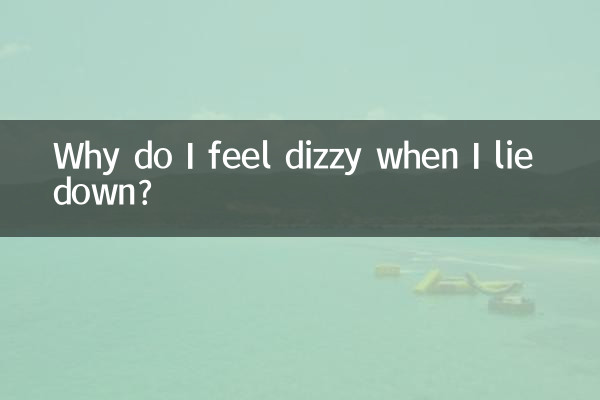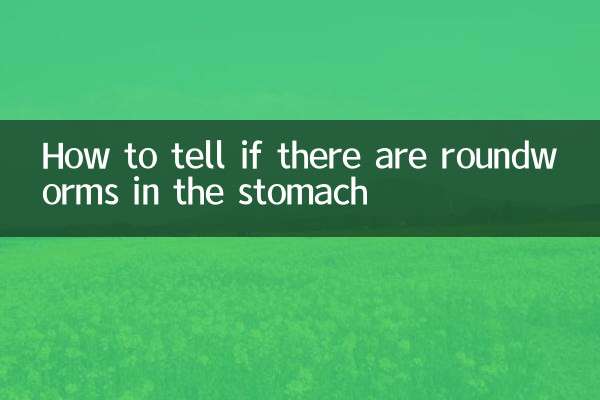Why do you feel dizzy when you lie down? Analysis of popular health topics on the Internet in the past 10 days
Recently, "dizziness while lying down" has become one of the popular search keywords on social platforms and health forums. Many netizens reported feeling dizzy when lying down or turning over, which caused widespread concern. This article will combine the hot discussions and medical information on the Internet in the past 10 days to provide you with a detailed analysis of the possible causes and countermeasures of this phenomenon.
1. Top 5 health topics on the Internet in the past 10 days

| Ranking | topic | amount of discussion | main focus |
|---|---|---|---|
| 1 | dizzy when lying down | 125,000+ | Orthostatic hypotension, otolithiasis |
| 2 | summer gastroenteritis | 98,000+ | Food hygiene and preventive measures |
| 3 | air conditioning disease | 83,000+ | Adaptation to temperature differences, respiratory problems |
| 4 | Insomnia improvement | 76,000+ | Sleep quality, melatonin use |
| 5 | dry eyes | 69,000+ | screen time, artificial tears |
2. Analysis of common causes of dizziness while lying down
According to discussions between medical experts and netizens, there are several possible reasons for dizziness when lying down:
| Reason type | Proportion | Typical symptoms | susceptible groups |
|---|---|---|---|
| Benign paroxysmal positional vertigo (otolithiasis) | 43% | A brief spinning sensation, induced by specific postures | Middle-aged and elderly people, people with head trauma |
| orthostatic hypotension | 32% | Dark eyes and fatigue | Teenagers and people with weak constitution |
| vestibular neuronitis | 12% | Persistent dizziness and nausea | People after a cold |
| cervical spine problems | 8% | Neck discomfort accompanied by dizziness | long-term desk worker |
| other reasons | 5% | Diversified performance | It depends on the specific situation |
3. Identification characteristics of different causes
To accurately determine which situation you belong to, you can refer to the following comparison of characteristics:
| identification point | Otolithiasis | orthostatic hypotension | vestibular neuronitis |
|---|---|---|---|
| duration | seconds to 1 minute | seconds to 2 minutes | days to weeks |
| induced action | Changes in head position | lie down or stand up | no obvious inducement |
| accompanying symptoms | Nystagmus | Darkness before eyes | Nausea and vomiting |
| Mitigation | stay still | change position slowly | drug treatment |
4. Answers to the 5 questions that netizens are most concerned about
1."Do you need immediate medical attention if you feel dizzy while lying down?"
In most cases, there is no need to panic, but if it is accompanied by severe headache, disturbance of consciousness, limb weakness and other symptoms, you should seek medical treatment immediately.
2.“Can otolithiasis heal on its own?”
About 50% of patients with otolithiasis can recover on their own within a few weeks, but repositioning treatment can significantly speed up recovery.
3.“How to test for otolithiasis yourself?”
You can try the Dix-Hallpike test: lie down quickly from a sitting position and turn your head 45 degrees to see if it induces vertigo, but it is recommended to do it under the guidance of a professional.
4."How to prevent orthostatic hypotension?"
Slowing down when getting up or lying down, increasing water and salt intake, and wearing compression stockings may help.
5.“Does summer heat make dizziness worse?”
It will. High temperature leads to blood vessel dilation, dehydration, etc., which may aggravate the symptoms of orthostatic hypotension.
5. Preventive measures recommended by professional doctors
1. When changing body positions (such as from lying to sitting, from sitting to standing), the movement should be slow and can be done in steps.
2. Ensure adequate water intake, especially in summer, at least 1500-2000ml per day
3. Avoid sudden large head movements, especially for middle-aged and elderly people
4. Measure your blood pressure regularly to understand your basic blood pressure status
5. Strengthen balance training, such as Tai Chi, yoga and other gentle exercises
6. When do you need medical treatment?
It is recommended to seek medical treatment promptly when the following situations occur:
- Recurrent dizziness, affecting daily life
- Accompanied by symptoms such as hearing loss and tinnitus
- Severe headache and vomiting
- Loss of consciousness or limb weakness
- Symptoms persist for more than 2 weeks without relief
Recent online discussions show that about 65% of "lying-down dizziness" cases are benign conditions, but possible pathological factors cannot be ignored. It is recommended that netizens with doubts record the characteristics of symptoms (time of onset, duration, predisposing factors, etc.), so that more accurate information can be provided to help diagnosis when seeking medical treatment.

check the details

check the details